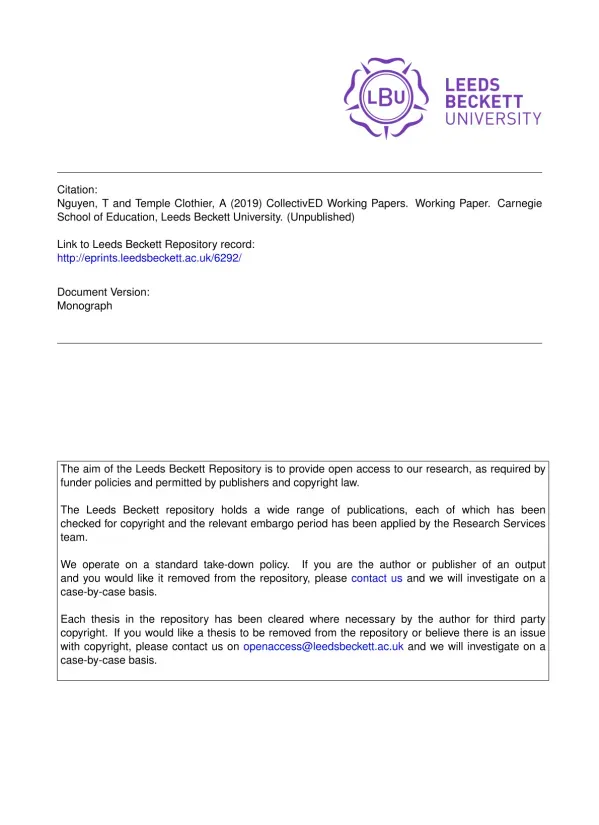
CollectivED Working Papers: Insights and Research on Mentoring and Coaching in Education
Document information
| Author | Rachel Lofthouse |
| School | Leeds Beckett University |
| Major | Education |
| Year of publication | 2019 |
| Place | Leeds |
| Document type | monograph |
| Language | English |
| Number of pages | 124 |
| Format | |
| Size | 1.10 MB |
- Mentoring
- Coaching
- Professional Development
Summary
I. Introduction to CollectivED
The CollectivED Working Papers serve as a vital resource for educators and researchers interested in the fields of mentoring and coaching. Established by the Centre for Mentoring, Coaching, and Professional Learning, these papers aim to foster collaborative conversations that enhance professional learning. The initiative emphasizes the importance of connecting research with practice, thereby creating a dynamic environment for educational improvement. The repository not only provides access to a diverse range of publications but also adheres to copyright regulations, ensuring that all works are appropriately vetted. This commitment to open access aligns with contemporary educational practices that prioritize transparency and collaboration. As stated in the document, 'The aim of the Leeds Beckett Repository is to provide open access to our research, as required by funder policies and permitted by publishers and copyright law.' This foundational principle underpins the significance of the CollectivED Working Papers in the academic community.
II. Key Themes in Mentoring and Coaching
The CollectivED Working Papers explore several key themes within the realms of mentoring and coaching. Notable contributions include insights into the stress experienced by educators and the implications of teacher accountability. For instance, Liz Beastall's paper raises critical questions about the normalization of stress in educational settings, suggesting that understanding stress through a language-games lens can lead to more effective coping strategies. Additionally, the papers address the development of self-efficacy among Black Minority Ethnic (BME) leaders, highlighting the role of mentoring in fostering confidence and leadership skills. The document emphasizes that 'Coaching, Confidence, and Retention' are interconnected, particularly for new teachers navigating their professional journeys. These themes underscore the multifaceted nature of mentoring and coaching, revealing their potential to transform educational practices and outcomes.
III. Practical Applications of Research Findings
The findings presented in the CollectivED Working Papers have significant practical applications for educators and institutions. The emphasis on collaboration and professional development is particularly relevant in today's educational landscape. For example, the report on a coaching and mentoring project for middle leaders illustrates how structured support can enhance leadership capabilities within schools. Furthermore, the insights into peer learning and its role in facilitating the inclusion of international students highlight the importance of diverse perspectives in educational settings. As noted in the document, 'These conversations happen during our CollectivEd events, during our Carnegie School of Education mentor training, and during our new PGCert.' Such initiatives not only promote professional growth but also foster a culture of inclusivity and shared learning. The practical implications of these findings extend beyond individual educators, influencing institutional policies and practices aimed at improving educational outcomes.
IV. Conclusion and Future Directions
The CollectivED Working Papers represent a significant contribution to the discourse on mentoring and coaching in education. By synthesizing research and practice, these papers provide valuable insights that can inform future educational strategies. The ongoing commitment to collaborative conversations and professional learning is essential for addressing the challenges faced by educators today. As the document states, 'We can never take full credit for changing practice; messages from many organizations and individuals weave together into individual decision-making and collective thinking.' This acknowledgment of the complex interplay between various stakeholders highlights the need for continued dialogue and collaboration. Looking ahead, the CollectivED initiative aims to expand its reach and impact, fostering a community of practice that prioritizes innovation and excellence in education. The potential for these working papers to influence educational policy and practice is immense, making them a crucial resource for educators and researchers alike.
Document reference
- A Tale of Two Mentors: Mentoring with perspective. (Victoria Crooks)
- Is stress always stressful? Using a language-games lens to raise questions about normalising stress in an age of teacher accountability. (Liz Beastall)
- Coaching for Wellbeing. (Andrew Macdonald-Brown)
- Developing Future Black Minority, Ethnic (BME) Leader’s Self-Efficacy through Mentoring and Coaching. (Lizana Oberholzer)
- Coaching, Confidence, and Retention: Instructional Coaching and New Teachers. (Mia Pumo, Jason Korreck, Geralyn Hollis, Gina Childers, and Barbara Zwadyk)
